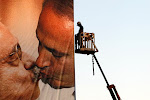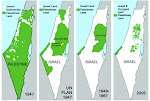Scores of settlers settling scores
 Burn baby burn. Settlers on horseback torched thousands of trees around Nablus yesterday, after setting Palestinian fields alight and stoning passing vehicles. Israeli occupation forces had urged the group to obey the law and shut down their illegal outpost. Most of the western press just yawned.
Burn baby burn. Settlers on horseback torched thousands of trees around Nablus yesterday, after setting Palestinian fields alight and stoning passing vehicles. Israeli occupation forces had urged the group to obey the law and shut down their illegal outpost. Most of the western press just yawned.
However, International Crisis Group warns against underestimating the effect of 280,000 rightwing Jewish settlers grabbing land and inserting themselves inside Biblical Judea and Samaria. If ignored, this burgeoning political and social phenomenon could undermine a sustainable Israeli-Palestinian peace, they say.
Israel is facing arguably unprecedented pressure to halt all settlement activity, led by a new and surprisingly determined U.S. administration. But the settlement issue has been transformed in recent years by shifting domestic dynamics, as national-religious and ultra-orthodox Israelis have gained influence and leverage. Entrenched in many West Bank settlements, they benefit from demographic trends: Israel’s army is increasingly dependent on their manpower and politicians on their votes.
“The religious right has assumed an ever more prominent role in opposing territorial compromise”, says Nicolas Pelham, a Crisis Group Senior Consultant based in Jerusalem. “It is banking on its support within state institutions to discourage the government from taking action and on its own rank-and-file to ensure that every attempt to evict an outpost or destroy a structure, however insignificant, comes at a heavy price”.
The ultra-orthodox and national-religious camps account for the lion’s share of the 37 per cent increase in the settler population in the past six years. Although not a united bloc, their politicians hold over a fifth of Knesset seats, some 40 per cent of the ruling coalition. In Israel proper, their numbers are growing steadily, and they carry weight far in excess of their numbers. They occupy key positions in the military, government and legal and education sectors, as well as the bureaucracy, and are seeking to strengthen their ability to resist future territorial withdrawals by building up their influence within and without state institutions. Their role and concerns need to be understood if the obstacle settlements pose to a two-state solution is to be removed.
An agreed Israeli-Palestinian border would make clear which settlers could remain in place and which could not. Several long-overdue steps should be taken in the interim, however. Legislative enactment of an early evacuation compensation package could help persuade some settlers to leave voluntarily. For those who value their attachment to the land over their attachment to the state, efforts could be made to examine how and under what conditions they might live under Palestinian rule and the extent to which Palestinians might accept them. Foreign actors, the U.S. included, should examine ways of making religious parties feel part of the diplomatic process. A clear offer by the Palestinian leadership to guarantee and protect Jewish access to Jewish holy sites under its control could send religious sectors a positive signal of its vision for post-conflict relations.
At the same time, the government should apply its laws more consistently, whether on settlement and outpost construction in the West Bank or acts of violence and incitement against Palestinians.
“The 2005 disengagement from Gaza went remarkably smoothly, but it would be wrong to assume that what happened in Gaza automatically will be replicated in the West Bank”, explains Robert Malley, Crisis Group’s Middle East Program Director. “The differences in numbers, background and militancy of the respective settler populations should serve as a warning of the need to give more attention to this issue as talks with Palestinians proceed”.

Venerable olive trees like this one bore the brunt of the protest. If this is politics as usual, perhaps the actions may pset some green activists.




















No comments:
Post a Comment